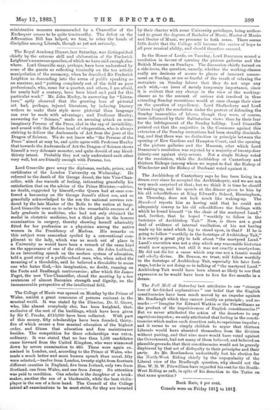In the House of Lords, on Tuesday, Lord Dunraven moved
a resolution in favour of opening the picture galleries and the British Museum on Sundays. The discussion chiefly turned on a side-issue, the question, namely, whether the working-classes really are desirous of access to places of innocent amuse- ment on Sunday, or are so fearful of the result of relaxing the restraints on Sunday labour that they do not urge any such wish,—an issue of merely temporary importance, since it is evident that any change in the view of the working- classes as to the amount of serious risk involved in thus extending Sunday recreations would at once change their view on the question of expediency. Lord Shaftesbury and Lord Cairns fought the resolution under the pretext of defending the Sunday immunities of labour, though they ware, of course, more influenced by their Sabbatarian views than by their fear for the infringement of the Sunday holiday. Lord Granville pointed out that the majorities in the Commons against this extension of the Sunday recreations had been steadily diminish- ing, and that there was no distinction in principle between the opening of Kew Gardens and Hampton Court, and the opening of the picture galleries and the Museum, after which Lord Dunraven's resolution was rejected by a majority of twenty-four (ninety-one against sixty-seven). Not a single Bishop voted for the resolution, while the Archbishop of Canterbury and thirteen Bishops (among whom we regret to find the Bishop of Winchester and the Bishop of Durham) voted against it.


































 Previous page
Previous page